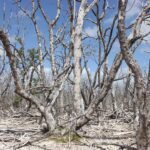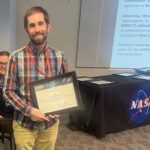The National Science Foundation (NSF) has launched a new resource management research program, Innovations at the Nexus of Food, Energy and Water Systems (INFEWS), and the University of Maryland’s Earth System Science Interdisciplinary Center (ESSIC) hopes to be part of the push.
At the NSF-sponsored Food-Energy-Water Nexus Workshop on Oct. 27 and 28, ESSIC researchers and their colleagues from around the nation and the world met at the World Bank headquarters in Washington, D.C., to share new ways of conceptualizing the interplay of these three vital resources. The workshop, one of 17 funded by the NSF, helped set the scene for INFEWS, which will fund a new wave of food-energy-water systems research.
“They’re assembling a series of calls for proposals,” said Fernando Miralles-Wilhelm, ESSIC/Atmospheric and Oceanic Science professor and Cooperative Institute for Climate and Satellites executive director, who conceived and organized the workshop. With those opportunities in mind, he aimed to focus the workshop on how scientists approach food, energy and water systems.
More than 40 scientists hosted five sessions at the workshop, discussing research needs as well as modeling approaches and applications around the world, such as monitoring crop development in Pakistan, assessing hydropower in Brazil and tracking the impacts of droughts on energy and food systems in China, South Africa and Central Asia.
“It was a very rich workshop in terms of the diversity of people that were there,” said Bruce Hamilton, NSF environmental sustainability program director, who attended the event.
“It was a great opportunity to learn what other people in the field were researching,” said Neal Graham, a University of Maryland doctoral student studying near-future climate change. He said he appreciated the presence of applications-focused scientists alongside the academics.
Integrated approaches
According to Miralles-Wilhelm’s initial proposal for the workshop, there is a need to integrate knowledge of natural and human systems into models and plans for resource management. Miralles-Wilhelm said the event was successful in showcasing such integrated approaches, as many of the speakers presented integrated assessment models for various aspects of food, energy and water.
“Even though for the most part in practice, water, food, energy, they’re being handled sort of separately, I think the next stage is going to require us to think more in an integrated fashion,” he said after the workshop.
The NSF has requested nearly $75 million from Congress for fiscal 2016 to support new research and education around the food-energy-water nexus. Calls for research proposals will depend on that funding, but the foundation is already accepting proposals for INFEWS graduate student research traineeships.
The traineeships are “basically funds to train students in this new area,” Miralles-Wilhelm said. “We’re excited about that because they’re fairly large, so that means you can actually invest in students.”
A variety of perspectives
According to Miralles-Wilhelm, the World Bank Group has been looking more into food-energy-water issues in recent years.
“These very large institutions, they tend to move very slowly, so I think their interest in hosting us was to sort of … take a look at what’s out there,” he said. “It was good to have the workshop there, because I think it attracted a … broader set of applicants.”
Daniel Sheer, a longtime water management planner and founder of HydroLogics consultancy, presented a pragmatic view at the workshop. Experienced in basin-level modeling and user-involved dispute resolution, he said the regional or global models presented at the event would benefit from more details and fewer assumptions.
“The details of the system can make an enormous difference in how well the system works,” Sheer said. He stressed that the goal of a model should be utility, quoting statistician George Box: “All models are wrong; some are useful.”
Nevertheless, the workshop was a good opportunity to learn from experts in a variety of fields, Sheer said, citing some “very useful conversations” he had with economists in attendance.
A strategic agenda
During the workshop’s first session, Massachusetts Institute of Technology engineering professor Dennis McLaughlin lamented what he saw as “a pretty intrinsic problem in education” that hinders research on the food-energy-water nexus: a disconnect between systems experts and specialists. “We all say we should talk to each other, but there’s not a whole lot of professional incentive for that.”
Miralles-Wilhelm hopes the ideas shared at the workshop will encourage better communication. Compared with many the other NSF-sponsored workshops, his focused more on approaches rather than specific technologies or regions, and he said his goal in summing up the workshop is to piece together the array of insights into a “strategic agenda” for food-energy-water modeling, in support of NSF’s growing investment in nexus research.
“Let’s try to go upstream to the very basic research of asking how water, energy and food activities are planned,” Miralles-Wilhelm said. “I think NSF liked our approach because we really moved upstream.”





